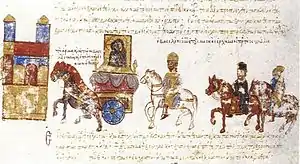971
Year 971 (CMLXXI) was a common year starting on Sunday (link will display the full calendar) of the Julian calendar.
| Millennium: | 1st millennium |
|---|---|
| Centuries: | |
| Decades: | |
| Years: |
| 971 by topic |
|---|
| Leaders |
|
| Categories |
|
| Gregorian calendar | 971 CMLXXI |
| Ab urbe condita | 1724 |
| Armenian calendar | 420 ԹՎ ՆԻ |
| Assyrian calendar | 5721 |
| Balinese saka calendar | 892–893 |
| Bengali calendar | 378 |
| Berber calendar | 1921 |
| Buddhist calendar | 1515 |
| Burmese calendar | 333 |
| Byzantine calendar | 6479–6480 |
| Chinese calendar | 庚午年 (Metal Horse) 3667 or 3607 — to — 辛未年 (Metal Goat) 3668 or 3608 |
| Coptic calendar | 687–688 |
| Discordian calendar | 2137 |
| Ethiopian calendar | 963–964 |
| Hebrew calendar | 4731–4732 |
| Hindu calendars | |
| - Vikram Samvat | 1027–1028 |
| - Shaka Samvat | 892–893 |
| - Kali Yuga | 4071–4072 |
| Holocene calendar | 10971 |
| Iranian calendar | 349–350 |
| Islamic calendar | 360–361 |
| Japanese calendar | Tenroku 2 (天禄2年) |
| Javanese calendar | 872–873 |
| Julian calendar | 971 CMLXXI |
| Korean calendar | 3304 |
| Minguo calendar | 941 before ROC 民前941年 |
| Nanakshahi calendar | −497 |
| Seleucid era | 1282/1283 AG |
| Thai solar calendar | 1513–1514 |
| Tibetan calendar | 阳金马年 (male Iron-Horse) 1097 or 716 or −56 — to — 阴金羊年 (female Iron-Goat) 1098 or 717 or −55 |

Emperor John I (middle) returns in triumph in Constantinople with the captured Boris II.
Events
Byzantine Empire
- Battle of Dorostolon: A Byzantine expeditionary army (possibly 30–40,000 men) attacks the Bulgarian frontier, personally led by Emperor John I. He lays siege to the fortress city of Dorostolon (located on the Lower Danube), and is reinforced by a fleet of 300 ships equipped with Greek fire.[1] The Kievan Rus' and their Bulgarian allies are reduced to extremities by famine. After a 3-month siege, Grand Prince Sviatoslav I agrees to sign a peace treaty with the Byzantines, whereby he renounces his interests towards Bulgarian lands and the city of Chersonesos in Crimea. Sviatoslav is allowed to evacuate his army to Berezan Island, while the Byzantines enter Dorostolon. John renames the city Theodoropolis (named after the reigning Empress Theodora).[2]
- John I returns in triumph to Constantinople. He brings along Boris II, ruler (tsar) of the Bulgarian Empire, and his family, together with the contents of the Bulgarian imperial treasury. Boris is given the Byzantine 'court title' of magistros as compensation. The Bulgarian lands in Thrace and Lower Moesia become part of the Byzantine Empire.
Europe
Britain
Africa
- Battle of Alexandretta: The Byzantines defeat a Fatimid force (4,000 men) near Alexandretta (modern Turkey), while the main Fatimid army is besieging the fortress city of Antioch. Coupled with news of an advance against Damascus of the Qarmatians, the Fatimids are forced to lift the siege and withdraw to Egypt.
China
- January 23 – A war elephant corps of the Southern Han is defeated at Shao, by crossbow fire from Song Dynasty troops. The Southern Han Kingdom is forced to submit to the Song Dynasty. Ending Southern Han rule, but also the first regular war elephant corps employed in a Chinese army, that had gained the Southern Han victories throughout the 10th century.
Births
- Kushyar Gilani, Persian mathematician and geographer (d. 1029)
- Mahmud of Ghazni, emir of the Ghaznavid Empire (d. 1030)
- Oliba, Spanish count and bishop (approximate date)
- Rajendra Chola, Emperor of Chola Dynasty at its peak
Deaths
- Abū Ja'far al-Khāzin, Persian astronomer (b. 900)
- Anemas, Byzantine (Muslim) army commander
- Atto, bishop of Vic (Spain) (approximate date)
- Cuilén (or Cuilean), king of Alba (Scotland)
- Eraclus (or Evraclus), bishop of Liège
- Ja'far ibn Fallah, Fatimid general and governor
- Kalokyros, Byzantine patrician and pretender
- Li Jingda, prince of Southern Tang (b. 924)
- Muhammad al-Khushani, Umayyad historian
- Muhammad ibn Rumahis, Umayyad admiral
- Ordgar, English ealdorman and advisor
- Qian Hongzong, king of Wuyue (approximate date)
- Ziri ibn Manad, founder of the Zirid Dynasty
References
- Treadgold, Warren (1997). A History of the Byzantine State and Society. Stanford, California: Stanford University Press. p. 509. ISBN 0-8047-2630-2..
- Fine, John V. A. Jr. (1991) [1983]. The Early Medieval Balkans: A Critical Survey from the Sixth to the Late Twelfth Century. Ann Arbor: University of Michigan Press. pp. 186–187. ISBN 0-472-08149-7..
This article is issued from Wikipedia. The text is licensed under Creative Commons - Attribution - Sharealike. Additional terms may apply for the media files.